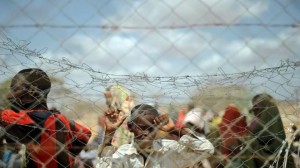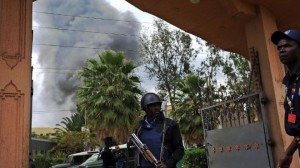By Abdullahi Mire

DADAAB (KENYA) (AFP) – Impoverished Somali refugee camps in northern Kenya could not be more different from upmarket malls in the capital Nairobi, but attacks by Somalia’s Shebab insurgents have affected them both.
Now, as Kenya reels from a four-day siege by the Al-Qaeda-linked gunmen in Westgate mall, Somalis in the country are terrified of retaliatory attacks.
“We are now more fearful than ever,” said Mohamed Sheikh, a refugee living in the vast Dadaab complex, the world’s largest refugee camp where row after row of tin shacks and shelters made of plastic and branches stretch almost as far as the eye can see.
The camp, in northeastern Kenya and close to the border with war-torn Somalia, hosts over 405,000 Somalis who fled conflict.
Many hate the extremist Shebab as much as Kenyans in Nairobi do, after the devastating bloodbath in the shopping centre which left at least 67 dead and dozens more missing.
“It was the Shebab that did everything bad to us in Somalia… and they are now following us to Kenya,” Sheikh added. “But Kenyan officials can’t see the difference between them and us.”
Shebab fighters said they carried out the attack in retaliation for Kenya’s two-year battle against the extremists’ bases in the country.
The brutality of the Westgate attack, where gunmen executed children and raked huddled groups of shopper with bullets, has sparked fear it will provoke a backlash against the wider Somali community.
‘They want to divide us’
It is not only refugees in Dadaab who are worried.
Northeastern Kenya is dominated by ethnic Somalis, while in Nairobi, the bustling district of Eastleigh with its crowded, potholed streets is dubbed “Little Mogadishu” after Somalia’s capital.
“The attack was a huge problem for us. We are peace-loving and the community we live in wants peace too,” said Abdihakim Bidar, a Somali businessman in Eastleigh.
“But the Shebab want mayhem in Kenya, they want to divide us and spark war between Somalis and Kenyans”.

During the siege, businessmen from Eastleigh delivered food and water to the soldiers and medical teams surrounding the complex as the battles inside raged.
Ethnic Somali Kenyans in the security forces also risked their lives to bring out shoppers from the bloodbath.
Kenyan authorities have called for communities to stay calm, with President Uhuru Kenyatta saying as he announced the end of the siege on Tuesday that people must remain “tolerant, caring, generous and loyal to one another.”
Kenyan social media users have also promoted the call for unity.
But rights groups have accused Kenyan police in the past of a brutal campaign against Somali refugees, following a string of grenade attacks or shootings inside Kenya blamed on supporters or members of the Shebab.
Human Rights Watch earlier this year documented multiple cases of police rape of Somali refugees.
“Last year my wife was attacked by a group of men… they beat her because she was originally Somali,” Bidar added. “People use such events to their own advantage.”
In the Kenyan garrison town of Garissa — close to the Somali border and hit regularly by attacks blamed on the Shebab, from roadside bombs to a church massacre in July 2012 that killed six — the Westgate siege has heightened long existing fears.
“When the first news broke of the mall siege it was worrying, but when Al-Shebab claimed it was even worse,” said Mohamed Sulub, a 40-year-old trader in Garissa.
“We are innocent people, but Kenyans of other tribes see us as bad. We are not, it is only Al-Shebab that has no religion or tribe.”
Source: AFP


